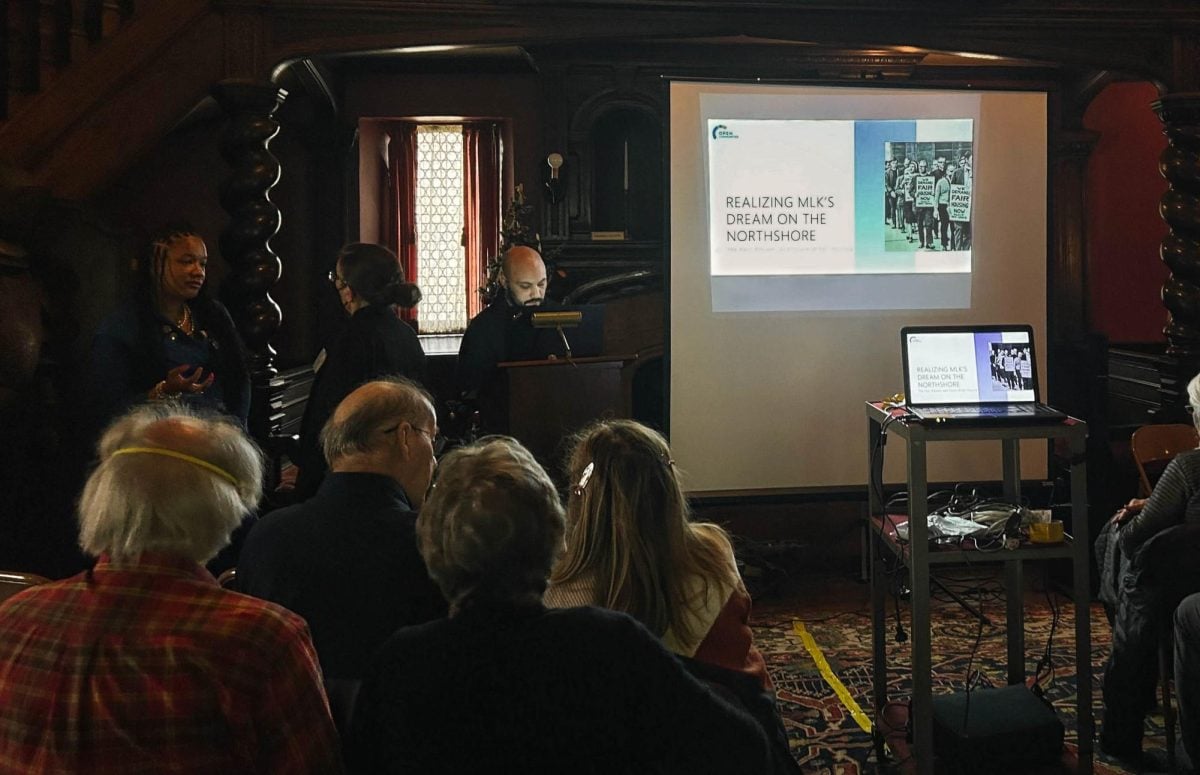About 80 Northshore residents filled the front room of the Evanston History Center Thursday for a presentation and panel discussion on the legacy of Rev. Martin Luther King Jr. and his vision for affordable and fair housing.
The first-time event brought together speakers from local organizations that advocate for affordable housing including Connections for the Homeless, FirstRepair and Open Communities.
“Things become more subtle, but discrimination is real and alive,” said Dominic Voz, director of fair housing at the local nonprofit Open Communities, to open a panel discussion on housing equality.
Voz opened the event by placing the discussion in a historical context.
The history of activism in the greater Chicago community is intimately connected to advocacy for fair housing — by virtue of King’s role in the Chicago Freedom Movement, which focused on housing inequalities faced by black families, Voz explained.
“We’re very proud to have this direct, not abstract or tangential, but direct connection to the Civil Rights Movement of the 1960s, and we try to position our work in that light,” Voz said.
He ended his opening remarks with an analysis of former redlining maps in the Evanston community.
In 2022, data showed that the formerly redlined 5th Ward had a five- to 13-year lower life expectancy than surrounding predominantly white and affluent neighborhoods, according to Voz’s presentation. This is a snapshot of the tangible effects of housing inequality, he said.
After Voz’s opening presentation, Vanessa A. Johnson-McCoy, another member of Open Communities, moderated a panel discussion that described the past, present and future of the fair housing initiative in Evanston. The initiative was championed by the nonprofits represented at the panel.
Former Ald. Robin Rue Simmons (5th), a national advocate for reparations born and raised in the area, said that it is important to lift up Black communities who still thrived in spite of the forces waged against them.
Sue Loellbach, the director of advocacy at Connections for the Homeless, said although redlining was outlawed by the Fair Housing Act in 1968, zoning codes continue to create barriers to fair housing.
Zoning regulations establish zones where no affordable housing could be built, preserving patterns of housing inequality even after redlining was prohibited, Loellbach said. Meanwhile, areas like the 5th Ward are marked to build nearly whatever one wants, she noted.
“The zoning code is really about preventing change,” Loellbach said.
Zoning is not the only barrier, though, other panelists added.
Cheryl Lawrence, the CEO of Open Communities, mentioned issues such as appraisal bias, which refers to assigning a lower value to a home or property based on race or other aspect of the owner’s identity, also perpetuate systems of unfair housing.
Though the Fair Housing Act has helped to mitigate some of these issues, the enforcement mechanism is small, Lawrence said.
“(Enforcement of the Fair Housing Act) is really left up to organizations, nonprofits like Open Communities that have to go through a competitive grant process in order to get funding in order to enforce the Fair Housing Act,” said Lawrence.
Following the panel discussion, Voz told The Daily that he knows conversations around housing inequities can leave people heavy-hearted. However, he said, the event is intended to promote solutions and get people involved.
Northwestern students have been a part of the conversation around fair housing initiatives since 1968 during the Bursar’s Office Takeover, when students protested for NU to provide a review of financial aid packages and equitable housing in Evanston. The importance of student involvement in the movement was something emphasized by Voz, who hopes to establish a line of community with Northwestern students moving forward.
Email: virginiahunt2026@u.northwestern.edu
Related Stories:
— City Council unanimously approves South Boulevard affordable housing development
— New Just Cause Ordinance hopes to ensure housing equitability for tenants
— Open Communities lawsuit alleges racial, income-based housing discrimination













